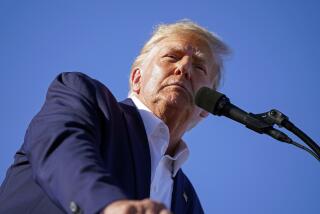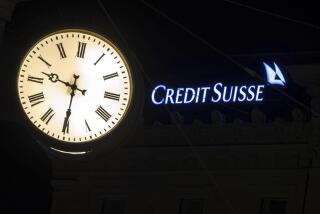COLUMN ONE : Ex-Despots Can’t Bank on the Swiss : The world’s dictators are being put on notice--if you’re ousted, don’t expect your nest egg to be waiting in Zurich or Basel.
- Share via
BERN, Switzerland — Swiss bankers and government officials say they have a warning for dictators and tyrants the world round:
Your money is no longer safe in the famous private bank vaults of Switzerland, they say. The rules have changed. If a revolution comes to your country and you are rudely tossed from power, don’t count on your nest egg to be waiting for you in the banks of Zurich or Basel or Geneva.
“If you are the dishonest leader of a country,” said federal banking regulator Daniel Zuberbuhler in an interview here in the Swiss capital, “you better not put your money here in Switzerland.”
On Monday, the provisional government of Romania formally requested Swiss authorities to freeze any assets of former dictator Nicolae Ceausescu held in Swiss banks. In fact, the Swiss government had already taken the preliminary step of ordering banks to freeze any Ceausescu assets on Dec. 22 after a Romanian exile claimed that the dictator and his family had hidden $400 million here.
But the request Monday made it official, placing Romania in line behind the Philippines, Haiti, Panama and Paraguay in seeking assets of their former rulers.
The Ceausescu case is the fifth since 1986 in which the Swiss government has acted to freeze assets of former national political leaders at the request of a new government that replaced them.
This new willingness by Swiss officials and bankers to intervene in the banking affairs of former political leaders represents a radical break in a long-held tradition of strict banking secrecy and political neutrality in this country.
In a country where tradition counts for practically everything, it is a revolutionary development akin to filling in the holes in Gruyere cheese or making chocolate bars from artificial chemicals.
Cases are also pending here against the families of the late Philippine leader Ferdinand E. Marcos; former Haitian leader Jean-Claude (Baby Doc) Duvalier; former Paraguayan strongman Alfredo Stroessner and Panama’s dictator, Gen. Manuel A. Noriega.
Legal action is also rumored to be under consideration against deposed Bulgarian leader Todor Zhivkov and the still-ruling leader of Zaire, Mobutu Sese Seko, whose Swiss holdings are said to be even larger than those of Marcos. Indeed, by some accounts, Mobutu may be the richest man in the world.
“It would seem now that if some bank has Mr. Mobutu’s money, they should get rid of it as soon as possible,” said Zuberbuhler, a federal attorney who is deputy director of the Swiss Bank Commission.
Switzerland, it seems clear, is no longer a guaranteed safe deposit box for the money stolen by corrupt leaders from Tehran to Tokyo.
Indeed, while the list of countries that have traditionally acted as tax havens, laundries and depositories of dirty money remains long, there are fewer places for a cash-embarrassed dictator to stash loot securely, observers of the international banking scene say.
The U.S. invasion of Panama in December makes that country less inviting, although its new leaders say existing bank privacy laws do not need reform but only enforcement to restore their teeth. Luxembourg and Liechtenstein, too, are moving out of the business, the former so that its practices conform to those in the rest of the European Community, of which it is a member, and the latter to improve its image.
Many of the offshore money havens that remain are in the Caribbean--the Bahamas, Cayman Islands, Netherlands Antilles and the Turks and Caicos, for instance--but the observers note that in many cases, these lack the facilities and communications, and above all the political security, that Switzerland offers.
Reformers in Switzerland hail their country’s change of attitude as an important step into the world of laws.
“The Swiss people are no longer comfortable with a reputation for being a safe haven for crooks who are leaders of countries,” said banking regulator Zuberbuhler.
“We should liberate Switzerland from dirty money. We don’t need it,” commented Zurich-based lawyer Moritz Leuenberger.
Leuenberger represents the governments of the Philippines and Romania in lawsuits to retrieve money that they contend was stolen by their former leaders. As a member of the Swiss Parliament, he led an investigation into banking procedures that resulted in two proposed new laws governing banks, including one that would make it a criminal offense for a banker to mask the identity of a client.
The practice had been common. During the Marcos proceedings, for example, it was discovered that the Philippine leader and his wife, Imelda, had communicated with a Swiss bank using the aliases “Mr. Saunders” and “Mrs. Ryan” and practiced false signatures to provide access to their accounts.
The new law, scheduled for consideration by the Swiss Parliament this spring, would require the bank to seek and record the true identity of the clients depositing or withdrawing money.
Bankers, while grudgingly going along with the program, worry that it will scare off other potential depositors, even those who are not corrupt leaders of Third World countries.
“The accumulation of these cases has resulted in a negative image,” complained Ulrich Grete, executive vice president of Union de Banques Suisses in a recent interview in Zurich.
Union de Banques Suisses is the largest banking company in Switzerland and one of the largest-volume banks in the world.
James Bond Villains
“If there is corruption somewhere in the world, the talk always turns to Swiss banks. In every James Bond movie, every bad guy has an account in Switzerland. It is some kind of juicy detail that seems to be required.”
In fact, said Grete, most Swiss banks have been policing themselves for years. Robert Studer, president of Grete’s bank, commented recently in an interview with the Swiss newspaper Der Bund: “We do not refuse the money of political leaders as a matter of principle. That would be extraordinarily unjust. But before we do business with a political leader, it first must be approved by a member of the executive board.”
Many Swiss bankers complain that there is too much subjectivity and hindsight involved in dealing with political leaders.
“Whether somebody is a good guy or a bad guy can change overnight,” said Grete.
Indeed, before their fall from power, Marcos, Noriega and Ceausescu were all at one time in favor with the United States and most other Western countries.
Further, there is widespread concern in the banking business that the tough new stand toward dictators will chase away legitimate clients.
“It presents us with a dilemma,” said Jean-Paul Chapius, managing director of the Swiss Bankers Assn. “We have taken action to avoid questionable funds from coming to Switzerland. They are not worth it to us. . . . The difficulty is trying to convince the good clients that they have nothing to fear.”
The change in Swiss government attitudes toward dictators and their money began in 1986 when the new Philippine government of President Corazon Aquino asked Swiss authorities to freeze the Marcos family assets here.
U.S.-Swiss Agreement
Starting in 1977, when the Swiss signed a mutual assistance agreement with the United States and European countries, the Swiss government and banks had agreed to cooperate in cases involving drugs and organized crime. However, the officials felt then that political cases should not be touched. So when Ethiopia’s Emperor Haile Selassie was chased from the throne in 1974, the Swiss refused to open his account to the new Ethiopian government.
Likewise, in February, 1979, they declined a request by the revolutionary Iranian government to freeze the funds of the deposed Shah Mohammed Reza Pahlavi.
“We live in a world where governments come and go,” former Swiss Prime Minister Kurt Furgler told Parliament at the time, reflecting the prevailing attitude of his era. “I ask you: Is it necessary with each change in regimes to wipe out all the existing contracts with the previous regime? What would become of our credibility as a lawful state?”
But faced with the huge sums cached in Swiss banks by Marcos, the federal executive council of Switzerland reversed its position. When an agent for Marcos attempted to withdraw $200 million from an account with the large bank Credit Suisse, the Swiss leadership balked.
“For the first time after World War II,” wrote Swiss journalist Jean-Claude Buffle in a recent article on the changing Swiss bank regulatory practices, “the government subordinated its economic interests to the superior interests of our country and its international reputation.”
More to Read
Sign up for Essential California
The most important California stories and recommendations in your inbox every morning.
You may occasionally receive promotional content from the Los Angeles Times.













